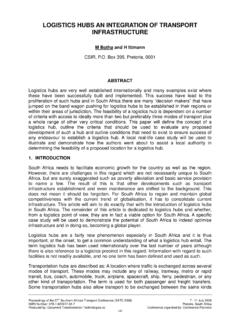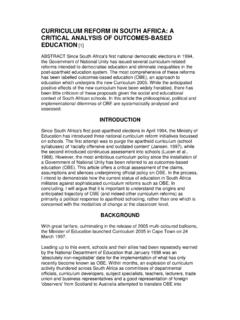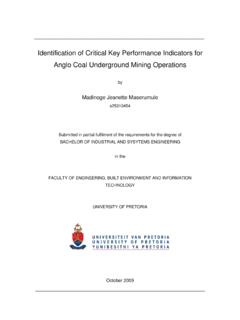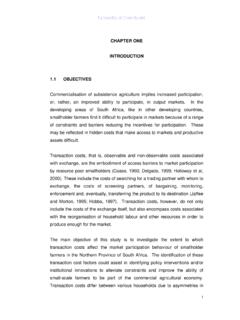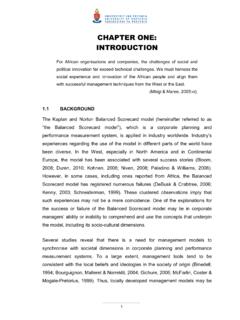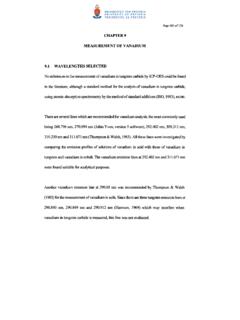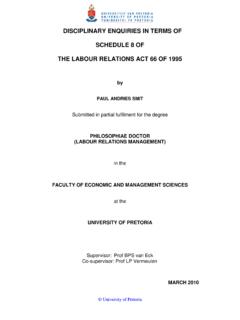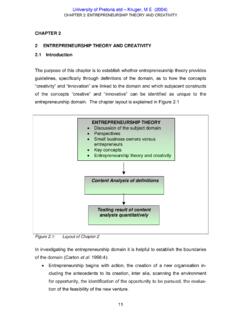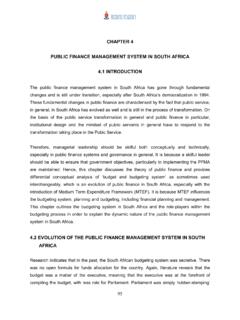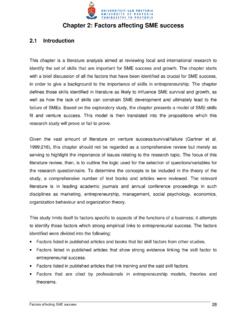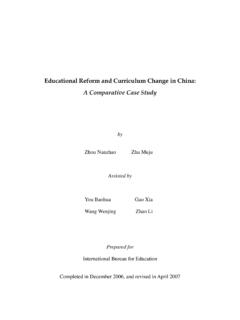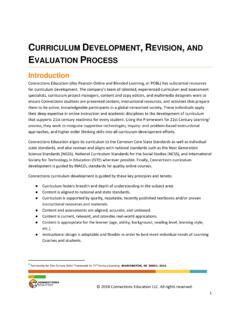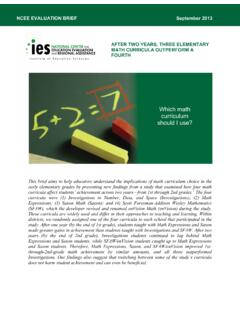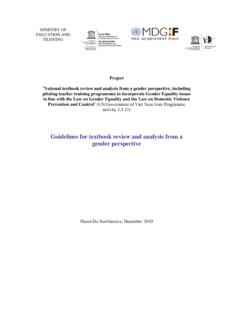Transcription of CURRICULUM REFORM IN SOUTH AFRICA: A CRITICAL …
1 CURRICULUM REFORM IN SOUTH AFRICA: A CRITICAL ANALYSIS OF OUTCOMES-BASED EDUCATION [1] ABSTRACT Since SOUTH Africa's first national democratic elections in 1994, the Government of national Unity has issued several CURRICULUM -related reforms intended to democratise education and eliminate inequalities in the post-apartheid education system. The most comprehensive of these reforms has been labelled outcomes-based education (OBE), an approach to education which underpins the new CURRICULUM 2005. While the anticipated positive effects of the new CURRICULUM have been widely heralded, there has been little criticism of these proposals given the social and educational context of SOUTH African schools. In this article the philosophical, political and implementational dilemmas of OBE are systematically analysed and assessed. INTRODUCTION Since SOUTH Africa's first post-apartheid elections in April 1994, the Ministry of Education has introduced three national CURRICULUM REFORM initiatives focussed on schools.
2 The first attempt was to purge the apartheid CURRICULUM (school syllabuses) of 'racially offensive and outdated content' (Jansen, 1997), while the second introduced continuous assessment into schools (Lucen et al., 1988). However, the most ambitious CURRICULUM policy since the installation of a Government of national Unity has been referred to as outcomes-based education (OBE). This article offers a CRITICAL assessment of the claims, assumptions and silences underpinning official policy on OBE. In the process, I intend to demonstrate how the current status of education in SOUTH Africa militates against sophisticated CURRICULUM reforms such as OBE. In concluding, I will argue that it is important to understand the origins and anticipated trajectory of OBE (and indeed other CURRICULUM reforms) as primarily a political response to apartheid schooling, rather than one which is concerned with the modalities of change at the classroom level. BACKGROUND With great fanfare, culminating in the release of 2005 multi-coloured balloons, the Minister of Education launched CURRICULUM 2005 in Cape Town on 24 March 1997.
3 Leading up to this event, schools and their allies had been repeatedly warned by the national Department of Education that January 1998 was an 'absolutely non-negotiable' date for the implementation of what has only recently become known as OBE. Within months, an explosion of CURRICULUM activity thundered across SOUTH Africa as committees of departmental officials, CURRICULUM developers, subject specialists, teachers, lecturers, trade union and business representatives and a good representation of foreign 'observers' from Scotland to Australia attempted to translate OBE into workable units of information for teaching and learning which would be ready for first phase implementation in 1998. At first glance, there appear to be sound reasons for a CURRICULUM policy modelled on OBE. Outcomes would displace an emphasis on content coverage. Outcomes make explicit what learners should attend to. Outcomes direct assessment towards specified goals. Outcomes signal what is worth learning in a content-heavy CURRICULUM .
4 Outcomes can be a measure of accountability, a means of evaluating the quality and impact of teaching in a specific school. These are universal claims associated with OBE in several first-world countries. Yet there are several problems documented regarding the OBE experience in these countries. Do outcomes in fact deliver what they claim? How do outcomes play out in a resource-poor context? Can outcomes survive their psychological roots in behaviourism? Do outcomes in different contexts mean the same thing, are outcomes specified for education equivalent to those identified for training? These are some of the questions addressed in this comprehensive criticism of OBE using as reference points the current status of SOUTH African schools, experiences of other countries with OBE and, more broadly, important philosophical arguments against an outcomes-based approach to education. OBE does not have any single historical legacy. Some trace its roots to behavioural psychology associated with Skinner; others to mastery learning as espoused by Benjamin Bloom; some associate OBE with the CURRICULUM objectives of Ralph Tyler; yet another claim is that OBE derives from the competency education models associated with vocational education in the UK (Mahomed, 1996).
5 In SOUTH Africa, the most immediate origins of OBE are in the competency debates followed in Australia and New Zealand (Christie, 1995), which animated training and development discussions in the Congress of SOUTH African Trade Unions (COSATU), which eventually appeared in documents of the national Training Board (such as the national Training Strategy Initiative) and, subsequently, crystallised in the national Qualifications Framework (NQF). It was largely the result of deliberations within the NQF to integrate education and training that the debate on competencies was extended to education. More recently, 'competencies' was reframed as 'outcomes' in the Department of Education. This history is important because it partly explains the growing disaffection with OBE in the education community, given the very recent exposure to this policy in schools and the absence of a sustained debate about OBE among teachers and educators. It also explains the parameters of the criticism which follows.
6 PRINCIPAL CRITICISMS OF OBE In this article I outline 10 major reasons why OBE will have a negative impact upon SOUTH African schools. My thesis is that OBE will fail, not because politicians and bureaucrats are misinformed about conditions of SOUTH African schooling, but because this policy is being driven in the first instance by political imperatives which have little to do with the realities of classroom life. Rather than spawn innovation, OBE will in fact undermine the already fragile learning environment in schools and classrooms of the new SOUTH Africa. First, the language of innovation associated with OBE is too complex, confusing and at times contradictory. A teacher attempting to make sense of OBE will not only have to come to terms with more than 50 different concepts and labels but also keep track of the changes in meaning and priorities afforded to these different labels over time. For example, to understand the concept of 'outcomes' requires understanding of competencies, unit standards, learning programmes, CURRICULUM , assessment criteria, range statements, equivalence, articulation, bands, levels, phases, CURRICULUM frameworks and their relationship to the SOUTH African Qualifications Authority (SAQA), the NQF, national Standards Bodies (NSBs), Standards Generating Bodies (SGBs) and Education and Training Qualification Agencies (ETQAs), reconciliation of the 12 SAQA fields with the eight learning areas with the eight phases and the fields of study, and on and on.
7 But it also requires understanding the sudden shift from 'competencies' to 'outcomes' in the official discourse on OBE, what lies behind the change and how the two terms now relate within the new policy. The only certainty about OBE and its predecessor language is that it has constantly changed meaning. This language is quite simply inaccessible. So, for example, essential outcomes are distinguished in most policy papers from specific outcomes whilst the former has recently been displaced by ' CRITICAL outcomes'. Having been there from the beginning, when COSATU first proposed competency-based education in the early 1990s, an idea taken up in the national Training Board and transferred into the Department of Education as official discourse, I still find the maze of jargon and tortured definitions intimidating. For this reason alone, the language of OBE and its associated structures are simply too complex and inaccessible for most teachers to give these policies meaning through their classroom practices.
8 Second, OBE as CURRICULUM policy is implicated in problematical claims and assumptions about the relationship between CURRICULUM and society. Among advocates, OBE policy claims in SOUTH Africa are either associated with, stated as prerequisite for or sometimes offered as a solution to economic growth. Consider the following: SOUTH Africa's inability to generate an economic growth rate to sustain all of its redress needs is largely due to the lack of relevant skills .. [the] present education and training system is designed to meet the needs of an outdated and narrowly Taylorist specification and this renders the economy incapable of competing with workforces that are trained to be 'self-directed, innovative and reflective'. (Mahomed, 1996; following Tyers, 1996) It is believed that the economy must grow at approximately 6% in order to create sufficient jobs to drastically reduce unemployment levels in the country, to absorb school leavers and the present unemployed.
9 SOUTH Africa's economy is however growing at a rate which is around 3%. In order to change this the transformation of the Labour Market is seen as being a step in the creation of growth. This would require a clear change in the nature of the SOUTH African education system. Hence the move towards an outcomes-based approach to education. (Department of Education, undated a) Allied to the vision of SOUTH Africa as a prosperous .. internationally competitive country, is a vision of its people as literate and productive human beings. (Department of Education, undated b) Equally OBE is argued as facilitating human resources development and potentially contributing to a vibrant economy. ( national CURRICULUM Development Committee, 1996) There is not shred of evidence in almost 80 years of CURRICULUM change literature to suggest that altering the CURRICULUM of schools leads to or is associated with changes in national economies. Even the most optimistic of studies, conducted in Tanzania and Colombia by the World Bank, suggest that there is simply no evidence from experimental research that CURRICULUM diversification, an attempt to make CURRICULUM responsive to economic conditions, has 'significant' social or private benefits (Psacharopoulos & Woodhall, 1986, pp.)
10 60-64 and 229-235). This is particularly the case in developing countries, where economic problems have little to do with what happens inside schools and much more to do with the economics and politics of a third-world state, sustained high unemployment (Camoy & Samoff, 1990). What official documents therefore claim is at best misleading since they offer an economic development panacea to benefit those alienated from education and training under apartheid in the name of a complex CURRICULUM REFORM policy. To make such connections between CURRICULUM and society has understandable political goals, but these connections have no foundation in the accumulated research on CURRICULUM change. Not only does OBE offer a proposed solution to economic problems, it is also sold as a solution to universal and deeply entrenched pedagogical problems. Consider these claims in the popular version of NQF/OBE policy under the caption 'Let's find out more about Outcomes': In the old education system only the content of the courses and what the teacher or the textbook had to say was important.
